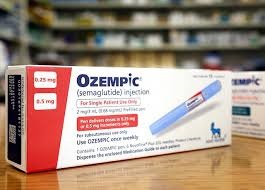Finding Ozempic Near Me
Finding Ozempic Near Me
Ozempic Near Me, Ozempic (semaglutide) has become a vital medication for managing type 2 diabetes, helping individuals control their blood sugar levels effectively. With its additional benefits, such as potential weight loss and improved cardiovascular health, knowing where to find Ozempic Near Me locally is essential. This blog post aims to guide you in locating Ozempic near you, ensuring you have access to this important treatment.

1. Understanding Ozempic
Ozempic is a prescription medication that belongs to the GLP-1 receptor agonist class. It mimics the effects of a natural hormone in the body, aiding in blood sugar regulation. Beyond managing diabetes, Ozempic can also promote weight loss and may reduce the risk of heart-related issues, making it a popular choice among healthcare providers.
Prescription Requirements for Ozempic
Obtaining a prescription for Ozempic is a crucial step in managing type 2 diabetes effectively. Since Ozempic (semaglutide) is a prescription medication, it’s essential to follow certain steps to ensure it is appropriate for your health needs. Here’s a detailed look at the prescription requirements:
1. Consultation with a Healthcare Provider
Your journey to obtaining Ozempic begins with scheduling a consultation with a healthcare provider, such as a primary care physician or an endocrinologist. During this appointment, the provider will:
- Review Medical History: Discuss your medical history, including any previous diabetes treatments, other health conditions, and family health history. This helps the provider assess your overall health and any potential risks associated with Ozempic.
- Evaluate Current Symptoms: Your provider will ask about your current symptoms related to diabetes management. This includes any challenges you face in controlling blood sugar levels, weight management issues, and overall lifestyle.
2. Blood Tests and Monitoring
To determine whether Ozempic Near Me is suitable for you, your healthcare provider may order specific blood tests:
- A1C Test: This test measures your average blood sugar levels over the past 2-3 months. It helps your provider understand how well your diabetes is being managed and whether Ozempic is a suitable option.
- Kidney Function Tests: Since Ozempic can impact kidney health, assessing kidney function is critical. Your provider may conduct tests to ensure your kidneys are functioning properly before prescribing the medication.
3. Risk Assessment
Your healthcare provider will assess any potential risks associated with prescribing Ozempic Near Me:
- Existing Health Conditions: Certain health conditions, such as a history of pancreatitis, thyroid cancer, or gastrointestinal issues, may disqualify you from using Ozempic Near Me. Your provider will carefully evaluate these factors.
- Medication Interactions: Discuss any current medications, supplements, or over-the-counter drugs you are taking. This is important to identify any possible interactions that could affect the efficacy of Ozempic or lead to adverse effects.
4. Discussion of Treatment Goals
During the consultation, your healthcare provider will discuss your treatment goals:
- Blood Sugar Control: Setting realistic targets for your A1C levels and overall diabetes management is vital. Your provider will help you understand how Ozempic can fit into your treatment plan.
- Weight Management: If weight loss is a goal, your provider will evaluate how Ozempic can assist you in achieving this objective while simultaneously managing your blood sugar levels.
5. Prescription Issuance
If your healthcare provider decides that Ozempic is appropriate for you, they will issue a prescription. The prescription will include:
- Dosage Instructions: Specific guidance on how much Ozempic to take and how often to administer it. Typically, it is injected once a week.
- Administration Guidance: Information on how to properly administer the injection, including tips on choosing injection sites and techniques to ensure safety and comfort.
6. Follow-Up Appointments
After starting Ozempic, follow-up appointments are crucial for monitoring your progress and adjusting treatment as necessary:
- Regular Check-Ups: Schedule regular visits to assess your response to the medication, monitor blood sugar levels, and discuss any side effects or concerns.
- Adjustments: Based on your progress and any side effects experienced, your healthcare provider may adjust the dosage or consider alternative treatments.
3. Where to Find Ozempic Near You
Local Pharmacies
Ozempic is widely available at major pharmacy chains such as CVS, Walgreens, and Rite Aid. Here are some tips for finding it locally:
- Call Ahead: Contact your local pharmacy to check if they have Ozempic in stock.
- Compare Prices: Prices may vary between pharmacies, so it’s worthwhile to check multiple locations for the best deal.
Specialty Pharmacies
Specialty pharmacies focus on medications that require specific handling. They often carry Ozempic and can provide additional support. To find a specialty pharmacy:
- Consult Your Doctor: Healthcare providers can recommend specialty pharmacies in your area.
- Insurance Provider: Check with your insurance company for a list of covered specialty pharmacies.
Online Resources
Utilizing online tools can help you find Ozempic nearby:
- Pharmacy Locators: Many pharmacy websites feature locators that can show you where Ozempic is available.
- Health Apps: Consider using health apps that can help you track your medications and locate pharmacies.
4. Cost and Insurance Considerations
The cost of Ozempic Near Me can vary significantly depending on your location and insurance coverage. Here are some key points to consider:
- Typical Cost: Ozempic generally ranges from $800 to $900 per month without insurance.
- Insurance Coverage: Many insurance plans cover Ozempic, but co-pays can differ. Always check with your insurer for specifics regarding your plan.
- Financial Assistance Programs: The manufacturer offers programs that may help reduce costs for eligible patients. Always inquire about available discounts.
5. Alternatives to Ozempic
If Ozempic isn’t the right fit for you, consider these alternatives:
- Other Medications: Discuss alternative diabetes medications with your healthcare provider to find the best option for your management plan.
- Lifestyle Changes: Incorporating healthy eating, regular exercise, and weight management can also support diabetes management effectively.
